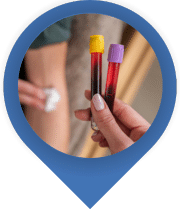The Latest Healthcare News
Check out our blog to learn more from our team about the latest medical advancements, health tips, and primary care news.

At AllCare, we offer comprehensive treatment for erectile dysfunction. Our experienced healthcare providers are dedicated to providing personalized care, guidance, and support for men experiencing erectile dysfunction. And you can be sure we always prioritize your well-being and comfort throughout your exam and treatment plan.
Erectile dysfunction (ED) affects nearly 30 million men in the United States, with prevalence increasing with age—about 40% of men experience some form of ED by age 40, and up to 70% by age 70.
It is important to have an open discussion with an AllCare health professional about your symptoms and how they affect your daily life. With our comprehensive, compassionate approach to erectile dysfunction, we can assess your condition, identify the cause, and suggest the best treatment options tailored to your needs. Our all-in-one model of care means you can receive your erectile dysfunction treatment, annual wellness check, preventative care, and additional services dedicated to men’s health in one convenient location. By streamlining your care through one doctor at AllCare, we can eliminate your need to see separate specialists.

Erectile dysfunction (ED) is the persistent difficulty in achieving or maintaining an erection sufficient for sexual activity. It’s a common condition, especially as men age, but it can affect men of all ages. ED may be rooted in various causes, including physical, psychological, and lifestyle factors, each requiring different approaches to treatment.
There are four main types of Erectile Dysfunction (ED):
While ED can be challenging emotionally, it’s also often a sign of underlying health issues, like cardiovascular disease or diabetes.

Depending on the cause of your erectile dysfunction, we may prescribe oral or injectable medications. Other treatment options include penis pumps and implants.

Based on your physical examination and your medical and sexual history, we may recommend specific blood tests or urine tests. These ED tests are designed to identify potential issues that could contribute to erectile dysfunction (ED), including diabetes, heart disease, kidney disease, and hormonal imbalances, such as low testosterone.

You will be asked about your medical and sexual history, including past surgeries, injuries, and medicines you take, which may determine the cause of your erectile dysfunction and whether the cause is physical or psychological.

Your doctor will examine your penis and testicles to confirm that everything looks normal and that the nerves are working correctly. They’ll also check for any signs of hair loss or enlarged breasts, which could suggest hormonal imbalances. Additionally, they will listen to your heart, measure your blood pressure, and examine your wrists and ankles to ensure your blood flow is healthy.

During this erectile dysfunction test, a wand-like is device placed over your penis, which uses sound waves to produce a video image of the blood vessels. This allows us to evaluate if your blood is flowing correctly.

If we suspect a mental or emotional issue may be contributing to your erectile dysfunction, we may ask a series of questions designed to identify conditions like depression or anxiety.

Once we determine the underlying cause of your erectile dysfunction, we may recommend an appointment with a urologist or a psychologist who specializes in sex therapy
Recognizing erectile dysfunction (ED) can be challenging, but there are common signs to look for. Men of all ages may experience symptoms, and it’s important to understand when to seek help. Key ED symptoms include:

Experience the convenience of telehealth appointments at AllCare. Our telemedicine services are designed to provide you with seamless access to healthcare without the need to leave your home. Whether you need an online doctor’s appointment for immediate or primary care, AllCare’s got you covered. With our online telehealth services currently available to individuals located in Virginia, Maryland, and Washington, D.C., you can connect with our experienced urgent and primary care physicians via secure video calls.
At AllCare, we are expanding our virtual healthcare access to all services previously offered in person. This includes:
Symptoms of erectile dysfunction can be frustrating and embarrassing. But you’ll want to discuss your symptoms with an AllCare physician to determine the underlying cause of erectile dysfunction, including heart disease, diabetes, high blood pressure or cholesterol, or mental disorders. AllCare offers convenient appointments that fit your schedule with experts who understand the unique needs of men.
Yes, occasional erectile dysfunction (ED) is common and can be triggered by various factors such as stress, fatigue, alcohol consumption, medications, and relationship issues. However, if ED occurs more than 25% of the time or significantly impacts your quality of life, it’s advisable to seek medical attention. Consulting with a healthcare provider can help identify any underlying issues and provide support for better sexual health.
Erectile dysfunction can often be effectively treated, and in some cases, it can be cured. Treatment options for a permanent cure for erectile dysfunction may include lifestyle changes, medications, or therapy, depending on the underlying cause. It is essential to work closely with a healthcare provider to determine the best approach tailored to your specific situation, as many men experience significant improvements in their erectile dysfunction symptoms with appropriate treatment.
While primary care physicians can effectively manage most cases of erectile dysfunction, some situations may require a referral to a specialist, such as a urologist or psychologist. If your ED is linked to complex health issues or psychological factors, a specialist can provide more targeted evaluations and treatments. Open communication with your healthcare provider will help determine whether a referral is necessary based on your individual circumstances.
The relationship between pornography consumption and erectile dysfunction is complex. Some studies suggest that excessive use of porn may lead to a desensitization effect, making it difficult for some men to achieve arousal in real-life sexual situations. This issue can be particularly relevant for younger men, who may find it challenging to engage in intimate encounters without the influence of porn.
Erectile dysfunction does not directly cause infertility, but it can create challenges for couples trying to conceive. Difficulty maintaining an erection can hinder sexual intercourse, potentially affecting conception efforts. Additionally, the emotional strain of ED can lead to stress and anxiety, which may further complicate the journey to parenthood. If you are experiencing ED and have concerns about fertility, consulting with a healthcare provider can help address these issues and explore treatment options to improve your chances of conception.
At AllCare, we’re proud to deliver exceptional primary and urgent care to residents across Virginia, Maryland, and Washington D.C. From bustling city centers to serene suburban neighborhoods, our clinics are strategically placed for your convenience and care. Experience top-tier Erectile Dysfunction Treatment in your community with AllCare, where your health is our priority.
Check out our blog to learn more from our team about the latest medical advancements, health tips, and primary care news.
Sexually transmitted diseases (STDs), also known as sexually transmitted infections (STIs), are often associated with noticeable symptoms like pain, discharge, […]
Read More >Depression can cause a range of symptoms that affect your thoughts, feelings, behavior, and sense of well-being. But, too often, […]
Read More >Facial pressure, nasal congestion, and persistent headaches are common signs of a sinus infection. These symptoms can make your daily […]
Read More >Our related healthcare services extend beyond immediate care to include preventive care such as routine physical exams, chronic disease management for conditions like diabetes, and specialty care referrals for more complex health issues.